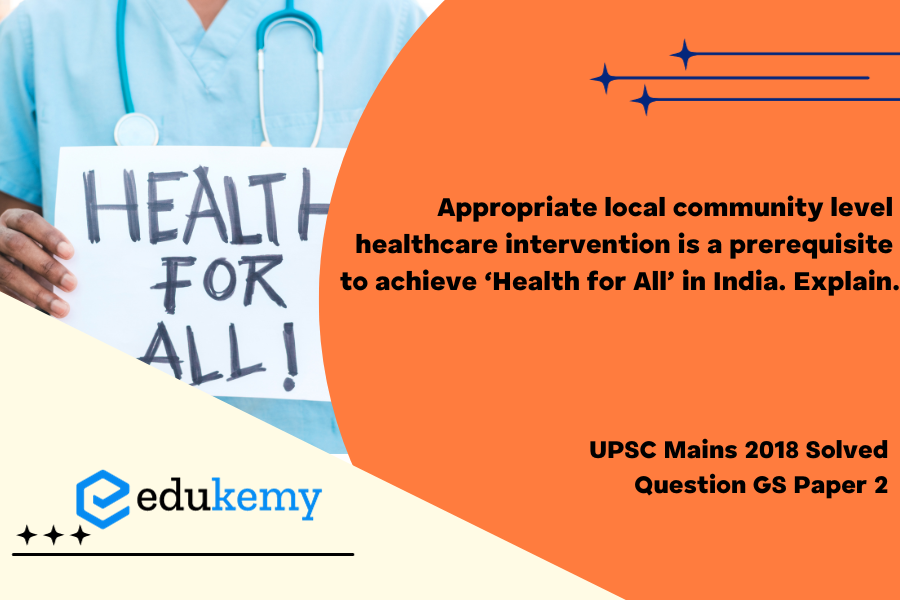In India, achieving ‘Health for All’ necessitates a targeted focus on local community-level healthcare interventions. The diverse and vast population, coupled with varied socioeconomic conditions, underscores the importance of tailoring healthcare initiatives to meet specific community needs. Appropriate local interventions not only address immediate health concerns but also contribute to long-term well-being by promoting preventive measures and health education. These interventions can bridge the gap between healthcare providers and communities, fostering a sense of ownership and trust. By understanding the unique challenges each community faces, healthcare can be delivered in a culturally sensitive and efficient manner. Moreover, localized interventions empower communities to actively participate in their healthcare, leading to increased health literacy and awareness. In essence, the prerequisite for ‘Health for All’ in India lies in the strategic implementation of community-centric healthcare initiatives that are responsive to the distinct needs and circumstances of diverse localities.
Tag: Issues relating to development and management of Social Sector/Services relating to Health, Education, Human Resources.
Contents
Decoding the Question:
- In Introduction, try to write the role of the State in public health.
- In Body,
- Discuss the importance of local community-level healthcare intervention.
- Write major health-related initiatives taken by the government.
- In Conclusion, try to link it with the SDG goal.
Answer:
Health for all means that all people have access to the health services they need (prevention, promotion, treatment, rehabilitation, and palliative care) without the risk of financial hardship when paying for them. This requires an efficient health system that provides the entire population with access to good quality services, health workers, medicines, and technologies. Article 47 of The Constitution of India is one of the Directive Principles which directs the State to raise the level of nutrition and the standard of living and to improve public health as among its primary duties.

Importance of Local Community-level Healthcare Intervention:
- Increased Outreach: Local community-level intervention is the first source of comprehensive and accessible health care that meets the immediate needs of individuals.
- Early Disease Detection: risk screening for early disease detection brings down the overall disease burden of the country. Detection of TB in the early stage.
- Preventive services: Provision of preventive services at the local level like vaccinations and family planning, nutrition, and maternal care can reduce the need for secondary and tertiary healthcare services.
- Addressing poverty: Management of chronic health conditions and palliative care at the local level can reduce the out-of-pocket expenditure for people.
- Doctor-to-patient ratio maintained: Maintaining the physician-patient ratio at the grassroots level can ensure the availability of doctors for all, reducing the dependence on quacks and eliminating preventable causes like incorrect treatment.
- Creating infrastructure at the local level: The healthcare intervention at the local community level should be supplemented by the upgradation of infrastructure, technological advancement, and capacity building of health workers.
- Decentralization: Involves local community health workers to effectively address the local healthcare needs. Ex: Gorakhpur acute Encephalitis syndrome.
- Monitoring communicable diseases: For example, screening COVID-infected patients and suggesting an appropriate response, acting as a Triage.
- Creating awareness: These can act as awareness creation centers for communicable and non-communicable diseases.
- Addressing inequality: These are easily accessible centers, which can be opened in the localities and require less investment, reducing geographical as well as economic inequality.
Major Health-Related Initiatives Taken by the Government:
- Local community-level healthcare interventions are extremely important; the Government has launched the National Health Mission that improves health infrastructural facilities at District and Sub-district levels.
- Accredited Social Health Activists Care (ASHA) workers are deployed as transformational change agents in every village; it has brought a significant impact on behavioral changes in the people.
- Ayushman Bharat Pradhan Mantri Jan Arogya Yojana: Ayushman Bharat Pradhan Mantri Jan Arogya Yojana of the Government of India aims to provide free access to healthcare for 50 crore people in the country. People using the program access their own primary care services from a family doctor.
According to WHO, 70 percent of the overall household expenditure on health in the country is on medicines; therefore, health and development are interlinked. The health goal (SDG 3) is broad: ‘Ensure healthy lives and promote well-being for all at all ages.’ To achieve this goal along with government initiatives mass awareness and participation is the primary need.
In case you still have your doubts, contact us on 9811333901.
For UPSC Prelims Resources, Click here
For Daily Updates and Study Material:
Join our Telegram Channel – Edukemy for IAS
- 1. Learn through Videos – here
- 2. Be Exam Ready by Practicing Daily MCQs – here
- 3. Daily Newsletter – Get all your Current Affairs Covered – here
- 4. Mains Answer Writing Practice – here


